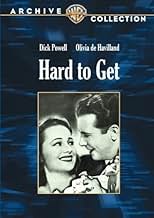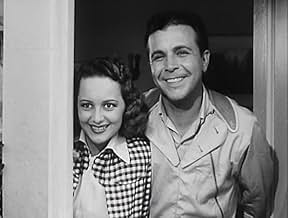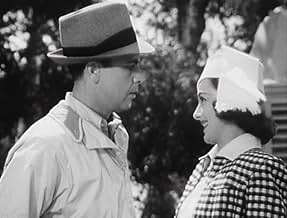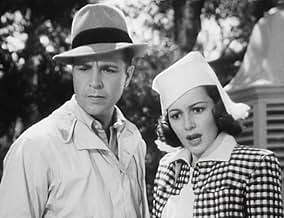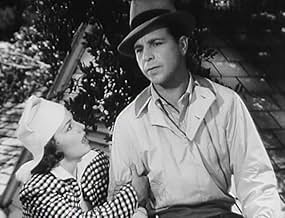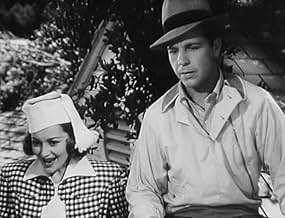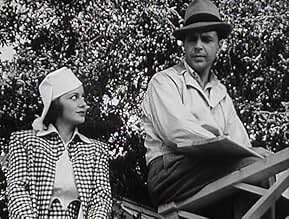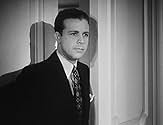La rica heredera Maggie busca vengarse de Bill, quien la hizo trabajar en su campamento, pero su plan toma un giro inesperado cuando financia la idea de negocio de él.La rica heredera Maggie busca vengarse de Bill, quien la hizo trabajar en su campamento, pero su plan toma un giro inesperado cuando financia la idea de negocio de él.La rica heredera Maggie busca vengarse de Bill, quien la hizo trabajar en su campamento, pero su plan toma un giro inesperado cuando financia la idea de negocio de él.
- Dirección
- Guionistas
- Elenco
Olivia de Havilland
- Margaret 'Maggie' Richards
- (as Olivia De Havilland)
Lowden Adams
- Atwater's Butler at Party
- (sin créditos)
Irving Bacon
- Gas Station Attendant
- (sin créditos)
Sidney Bracey
- Carl - Richards' Butler
- (sin créditos)
Nat Carr
- Construction Foreman
- (sin créditos)
Chester Clute
- Mr. Pinkey
- (sin créditos)
Opiniones destacadas
This is one of those films from the thirties where no effort is made to have a realistic story or characters, and where the purpose is purely fun. The film is highly amusing, although it has its corny moments. This is a rare glimpse of Olivia de Havilland as she was before GONE WITH THE WIND (1939) changed her career in the following year. Her co-star here is Dick Powell. A very bad makeup person has made Dick Powell all but unrecognisable by excessive makeup round his eyes, and has done no favours for Miss de Havilland either, as she is also made to look somewhat artificial, despite her costumes working very well and showing inspired touches. As is only to be expected, both stars excel in this romantic comedy and spark off each other nicely. The film also contains a wonderful performance by the British actor Melville Cooper as a droll butler, not unlike Jeeves (and probably modelled on him), who is even allowed the last word at the end. Charlie Winniger also gives one of his very good performances (for he could be a bit uneven and 'required direction') as Miss de Havilland's eccentric father. A famous song by Johnny Mercer was written specially for this film, 'You Must Have Been a Beautiful Baby' ('
cause, baby, you're beautiful now.') The film also features an amazing scene where Dick Powell in blackface does a marvellous imitation of Al Jolson singing 'Sonny Boy'. This film was certainly unconstrained in its casting about for new ways to laugh. Dick Powell also disguises himself as a woman scrubbing a floor in an office building, descends on a rope down the side of a New York skyscraper to enter an office window, and other antics. At one point Winniger is taken to the top of a skyscraper riding on a steel beam, as 'the elevators are not installed yet'. He holds a business meeting several hundred feet up, balancing on the beams, while Powell inserts rivets. Any wild situation will do for this story! At one point, the action is suddenly interrupted and we cut to Miss de Havilland and Powell sitting in a row-boat together at night, rowing across a lake in Central Park and falling in love. Some linking scenes must have been cut to get them there, but no one seems to mind the lack of continuity. Anything goes! Miss de Havilland starts as a rich spoilt brat who screams when she does not get her way. She falls out with Dick Powell, who works in a garage, over a bill for $3.48. Powell refuses her credit, and says if she were to fail to pay, he would 'not be able to afford lunch for a week'. That says a great deal about the value of money in 1938, if you could eat lunch for a week on $3.48. Miss de Havilland later falls in love with Powell, in a shockingly short period of time and with a lack of motivating circumstances. But she manages to switch from being a fiery-eyed bitch, passing through a phase of being a cunning schemer seeking vengeance, to a doe-eyed and love-struck maiden, with all the ease of an Olympic pentathlete who can do anything and who changes sports without noticing that he has stopped running 100 metres and is now throwing the javelin (or in this case, Cupid's dart). The film was directed by Ray Enright, who started as a gag writer for Mack Sennett, became an editor, and worked his way up to director. He never entered the top ranks but made lots of movies, retiring in 1956. If you want to have some laughs and be entertained, and do not mind films from the thirties, this will do nicely.
Hard To Get casts two of Jack Warner's most unhappy players on his lot in their second film together. Both Dick Powell and Olivia DeHavilland were begging Jack for more dramatic material to do and he was refusing both of them. Powell didn't get his first break in that department until years after he left Warner Brothers. As for Olivia, her salvation was coming next year when she loaned out to David O. Selznick for Gone With The Wind.
Olivia is a rich girl coming from a family that looks suspiciously like the Bullochs from My Man Godfrey with mother Isabel Jeans, younger sister Bonita Granville and father Charles Winninger. Olivia's the rebellious one who just doesn't want to go to Newport again with mom and sis. She takes the car and stops at a gas station owned by Dick Powell and Allen Jenkins. The gas station is also a small motel and when Olivia forgets to bring her purse and Powell doesn't believe she's rich, he forces her to turn down the beds for her gasoline.
That starts the usual sparring between the rich girl and the poor, but ambitious young man who has a plan for a chain of motel/filling station establishments across the country. If he can only get a rich backer.
I think anyone who's seen enough Thirties screwball comedies knows exactly how this is going to end up. The film isn't quite on the level as My Man Godfrey or Libeled Lady, but it certainly is amusing enough. Especially when you consider both the leads were begging their boss not to keep giving them light stuff to do.
Most amusing performance however is that of Penny Singleton as the maid in the Winninger household. Powell's got the idea DeHavilland is the maid there, mainly because she gave it to him and to keep the act up, Singleton impersonates DeHavilland at dinner. She's got the best moments in the film because of that. Second best are Powell trying in various disguises to see Thurston Hall, an associate of Winninger.
The film is best known for Dick Powell introducing You Must Have Been A Beautiful Baby on the screen, singing it to Olivia while rowing on Central Park Lake. For reasons unknown Powell never recorded this one. Bing Crosby has a primo version done for Decca in 1938.
Hard To Get today is remembered for the song that came from it and for the fact that two frustrated stars did some pleasant work here.
Olivia is a rich girl coming from a family that looks suspiciously like the Bullochs from My Man Godfrey with mother Isabel Jeans, younger sister Bonita Granville and father Charles Winninger. Olivia's the rebellious one who just doesn't want to go to Newport again with mom and sis. She takes the car and stops at a gas station owned by Dick Powell and Allen Jenkins. The gas station is also a small motel and when Olivia forgets to bring her purse and Powell doesn't believe she's rich, he forces her to turn down the beds for her gasoline.
That starts the usual sparring between the rich girl and the poor, but ambitious young man who has a plan for a chain of motel/filling station establishments across the country. If he can only get a rich backer.
I think anyone who's seen enough Thirties screwball comedies knows exactly how this is going to end up. The film isn't quite on the level as My Man Godfrey or Libeled Lady, but it certainly is amusing enough. Especially when you consider both the leads were begging their boss not to keep giving them light stuff to do.
Most amusing performance however is that of Penny Singleton as the maid in the Winninger household. Powell's got the idea DeHavilland is the maid there, mainly because she gave it to him and to keep the act up, Singleton impersonates DeHavilland at dinner. She's got the best moments in the film because of that. Second best are Powell trying in various disguises to see Thurston Hall, an associate of Winninger.
The film is best known for Dick Powell introducing You Must Have Been A Beautiful Baby on the screen, singing it to Olivia while rowing on Central Park Lake. For reasons unknown Powell never recorded this one. Bing Crosby has a primo version done for Decca in 1938.
Hard To Get today is remembered for the song that came from it and for the fact that two frustrated stars did some pleasant work here.
What would Hollywood have done if "It Happened One Night" hadn't been made? After that, the movies were peppered with heiresses, one of which was Olivia de Havilland in 1938's "Hard to Get" starring Dick Powell, Charles Winninger, Roscoe Jenkins, and Bonita Granville.
Margaret (de Havilland), an heiress, runs afoul of gas jockey Bill (Powell) because she doesn't have $3.48 to pay for gas and oil. He then makes her clean some bungalows. Outraged, she complains to her father (Winninger) and demands that he do something. He refuses and tells her to take care of it herself.
Margaret returns to the gas station, and, pretending to be the valet's daughter, makes nice, flirts, and goes out with Bill, who proceeds to tell her about a business venture for which he is seeking investors. Margaret then sets out to extract her revenge. And guess what happens along the way.
I'm not as enthusiastic about this film as some others on this board. It's totally predictable and, in my opinion, not one of the better screwball comedies, though there are some funny sections, especially toward the end.
Olivia de Havilland was absolutely beautiful and excellent as the spoiled heiress, and Dick Powell was delightful, as was his singing of "You Must Have Been a Beautiful Baby" and his entertaining "Sonny Boy," as a Jolson impersonation (blackface and all). Winninger and his friends (Melville Cooper, Thurston Hall) are very funny on the construction site at the end.
The cast makes it enjoyable.
Margaret (de Havilland), an heiress, runs afoul of gas jockey Bill (Powell) because she doesn't have $3.48 to pay for gas and oil. He then makes her clean some bungalows. Outraged, she complains to her father (Winninger) and demands that he do something. He refuses and tells her to take care of it herself.
Margaret returns to the gas station, and, pretending to be the valet's daughter, makes nice, flirts, and goes out with Bill, who proceeds to tell her about a business venture for which he is seeking investors. Margaret then sets out to extract her revenge. And guess what happens along the way.
I'm not as enthusiastic about this film as some others on this board. It's totally predictable and, in my opinion, not one of the better screwball comedies, though there are some funny sections, especially toward the end.
Olivia de Havilland was absolutely beautiful and excellent as the spoiled heiress, and Dick Powell was delightful, as was his singing of "You Must Have Been a Beautiful Baby" and his entertaining "Sonny Boy," as a Jolson impersonation (blackface and all). Winninger and his friends (Melville Cooper, Thurston Hall) are very funny on the construction site at the end.
The cast makes it enjoyable.
... and exhibit A as to why both Dick Powell and Olivia De Havilland ultimately fled from Warner Brothers for meatier roles. Still, it has its good points.
Maggie Richards (De Havilland) has just had a fight with her mother about not wanting to go to Newport for the summer, like most rich mothers and daughters did back in the day. As a result Maggie flees the scene by borrowing the valet's car and doesn't get far before she realizes she's out of gas. She stops at a gas station, lets the attendant (Dick Powell as Bill) fill up her car, and then tells him to "charge it", claiming to be the daughter of a wealthy man. The car isn't hers, she has no ID, and the money would come out of Bill's pocket if she never comes back, so he insists she return the gas or cough up the money, which she doesn't have since she ran out without her purse. When she tries to flee, Bill makes her make up the beds in all ten bungalows of the accompanying motor lodge to pay the bill, and hits her on the dernier with a broom when she tries to escape. Humiliated, Maggie vows revenge, but back home Dad (Charles Winninger) just is not interested in getting involved in this petty scrape.
Maggie returns the next day and gives Bill what he wants - a completely fabricated story about how sorry she is and tells him she is really wealthy Maggie Richards' maid. Bill buys this, dates her, and she tells him the password to get in to see Mr. Richards (Maggie's father), head of Federal Oil and Gas who might back his idea about building motor courts along with his company's gas stations. That password, however, was Mr. Richards' nickname in the oil fields when he started out in the business, plus Maggie knows her dad is really riled by strangers taking advantage of a password meant for old friends - much like a telemarketer calling an unlisted number. Mr. Richards gives Bill the business alright, but not the business Bill was hoping for. Maggie has her revenge, but she's starting to care for Bill and feel pangs of conscience about what she's done, but not before she has enlarged the ruse to ridiculous proportions so that if Bill finds out, she'll probably never see him again. How does this all work out? Watch and find out.
This could have been a better comedy, and it is pleasant enough as is, but there are some real inanities thrown into the situation, some funny some tiresome. One of funny parts is having Penny Singleton as the maid and Maggie switch roles for an evening. Penny is just perfect as a girl all dressed up like a plutocrat's daughter, but still with a working class demeanor and a rather limited and slanged vocabulary. This was the last film she did before she became famous as Blondie and she shows some of that comic flair in this film. The tiresome part of the film has to do with Mr. Richards, supposedly a self-made man, wanting to waste the day away with fifteen cent bets boxing, wrestling, and fencing his valet who always bests him. It's just not funny and seems out of character for a self-made man who had to be hard charging to get where he was. Why would he want to waste his time with such a silly pursuit? Recommended for fans of De Havilland and Powell, and for those great character actors who always added a touch of spice to these 1930's films.
Maggie Richards (De Havilland) has just had a fight with her mother about not wanting to go to Newport for the summer, like most rich mothers and daughters did back in the day. As a result Maggie flees the scene by borrowing the valet's car and doesn't get far before she realizes she's out of gas. She stops at a gas station, lets the attendant (Dick Powell as Bill) fill up her car, and then tells him to "charge it", claiming to be the daughter of a wealthy man. The car isn't hers, she has no ID, and the money would come out of Bill's pocket if she never comes back, so he insists she return the gas or cough up the money, which she doesn't have since she ran out without her purse. When she tries to flee, Bill makes her make up the beds in all ten bungalows of the accompanying motor lodge to pay the bill, and hits her on the dernier with a broom when she tries to escape. Humiliated, Maggie vows revenge, but back home Dad (Charles Winninger) just is not interested in getting involved in this petty scrape.
Maggie returns the next day and gives Bill what he wants - a completely fabricated story about how sorry she is and tells him she is really wealthy Maggie Richards' maid. Bill buys this, dates her, and she tells him the password to get in to see Mr. Richards (Maggie's father), head of Federal Oil and Gas who might back his idea about building motor courts along with his company's gas stations. That password, however, was Mr. Richards' nickname in the oil fields when he started out in the business, plus Maggie knows her dad is really riled by strangers taking advantage of a password meant for old friends - much like a telemarketer calling an unlisted number. Mr. Richards gives Bill the business alright, but not the business Bill was hoping for. Maggie has her revenge, but she's starting to care for Bill and feel pangs of conscience about what she's done, but not before she has enlarged the ruse to ridiculous proportions so that if Bill finds out, she'll probably never see him again. How does this all work out? Watch and find out.
This could have been a better comedy, and it is pleasant enough as is, but there are some real inanities thrown into the situation, some funny some tiresome. One of funny parts is having Penny Singleton as the maid and Maggie switch roles for an evening. Penny is just perfect as a girl all dressed up like a plutocrat's daughter, but still with a working class demeanor and a rather limited and slanged vocabulary. This was the last film she did before she became famous as Blondie and she shows some of that comic flair in this film. The tiresome part of the film has to do with Mr. Richards, supposedly a self-made man, wanting to waste the day away with fifteen cent bets boxing, wrestling, and fencing his valet who always bests him. It's just not funny and seems out of character for a self-made man who had to be hard charging to get where he was. Why would he want to waste his time with such a silly pursuit? Recommended for fans of De Havilland and Powell, and for those great character actors who always added a touch of spice to these 1930's films.
"Hard to Get" is what you might call a low-key comedy. There are some pratfalls, but the action is mostly at a relaxed pace, not frantic or riotous. Olivia de Havilland (as Margaret) and Dick Powell (as Bill) are delightful as the couple who find romance in a most unexpected (to them) way. She tears out of the house in a pique of rebelliousness but finds that the car's fuel tank is low. When she stops to get gas at a combination garage/motor court, she tries to charge the expense, but the attendant--who does not know her--refuses to extend her credit.
She's actually from a wealthy family, but Bill doesn't know that and he forces her to work for the cost of the gasoline by making beds and dusting in the motor court's bungalows. She concocts a scheme for getting even, which involves her father, Charles Winninger (Ben Richards).
If you believe the film, CEOs--like Mr. Winninger--spend their days wasting time or indulging in whimsical activities, like wrestling with their butlers, but it makes for a funny story.
The cast is excellent. Together they create a light-hearted comedy that revolves around a growing romance.
She's actually from a wealthy family, but Bill doesn't know that and he forces her to work for the cost of the gasoline by making beds and dusting in the motor court's bungalows. She concocts a scheme for getting even, which involves her father, Charles Winninger (Ben Richards).
If you believe the film, CEOs--like Mr. Winninger--spend their days wasting time or indulging in whimsical activities, like wrestling with their butlers, but it makes for a funny story.
The cast is excellent. Together they create a light-hearted comedy that revolves around a growing romance.
¿Sabías que…?
- TriviaDick Powell's Bill Davis has plans for a series of motor lodges from coast to coast. This would have been a logical investment possibility in 1938. The U.S. was inching into recovery from the Depression, employment was rising and some people were beginning to travel again. Car manufacturing was picking up and better roads were being built. Most motels were mom and pop operations, but business ventures around the country were just starting to look into motor lodges - or motels..
- ErroresWhen Bill is forcibly carrying Margaret from her car after she can't pay for the gas, just after they pass the pumps the shadow of the boom microphone can be seen following them on the ground.
- Citas
Mrs. Richards: The Potters are one of New York's oldest families. They came over with the Indians, or turkeys, or something.
Connie: You mean the pilgrims.
Ben Richards: She means the turkeys.
- ConexionesReferences La última canción (1928)
- Bandas sonorasYou Must Have Been a Beautiful Baby
(1938) (uncredited)
Music by Harry Warren
Lyrics by Johnny Mercer
Played during the opening and closing credits
Sung by Dick Powell
Played as background music often
Selecciones populares
Inicia sesión para calificar y agrega a la lista de videos para obtener recomendaciones personalizadas
Detalles
- Tiempo de ejecución
- 1h 22min(82 min)
- Color
- Mezcla de sonido
- Relación de aspecto
- 1.37 : 1
Contribuir a esta página
Sugiere una edición o agrega el contenido que falta



